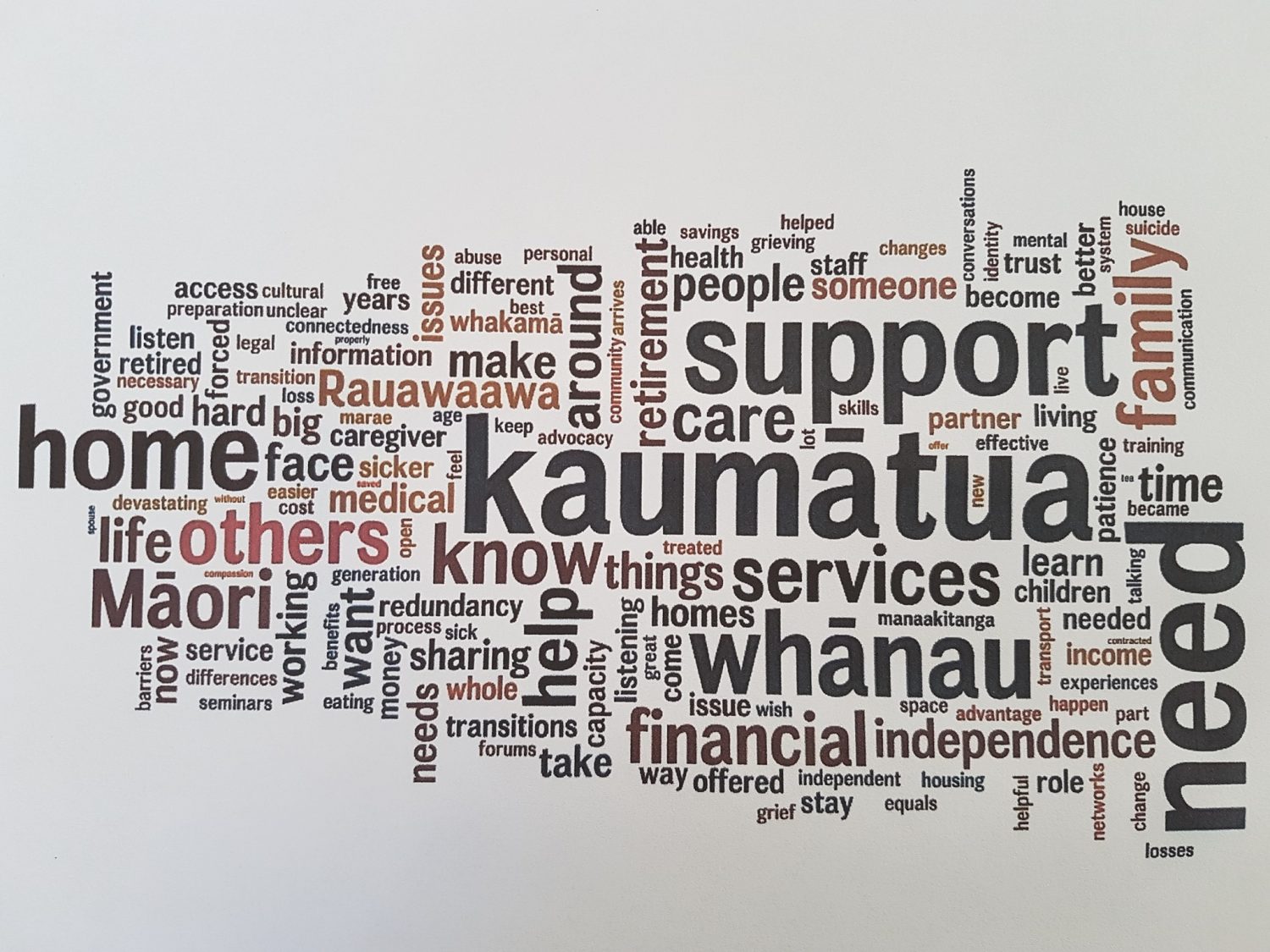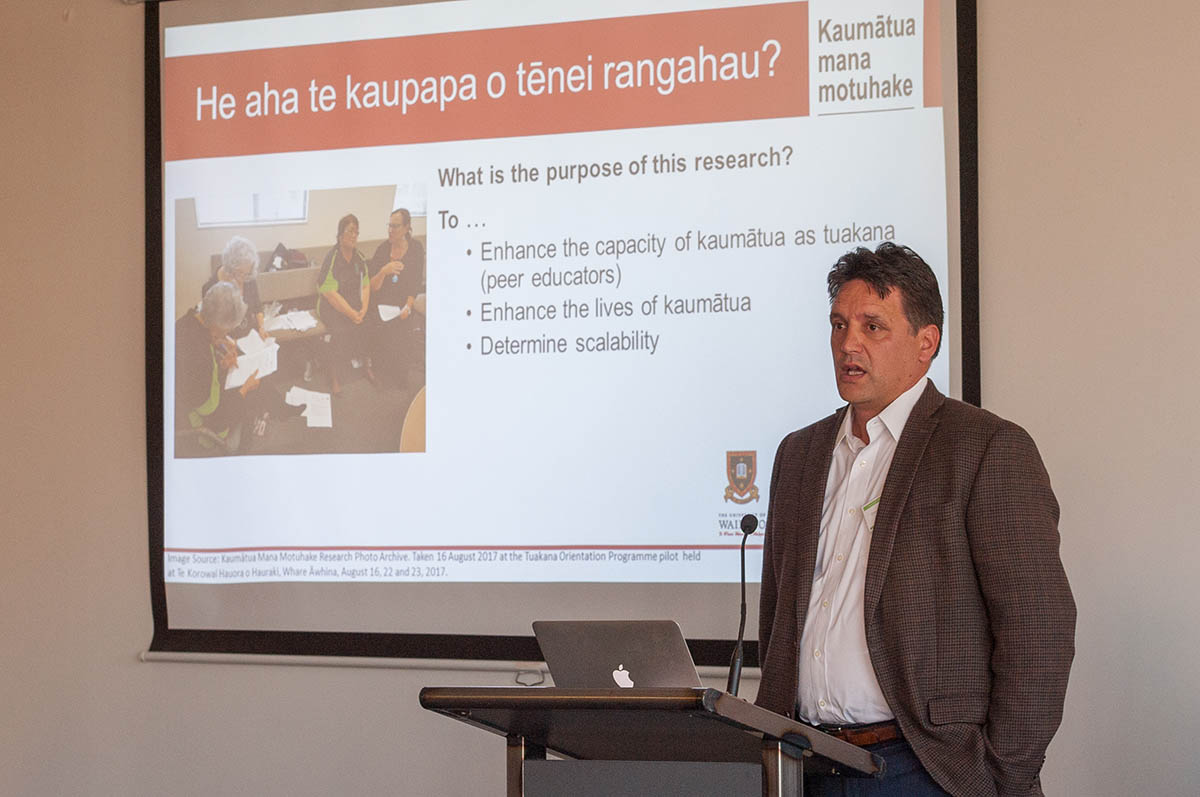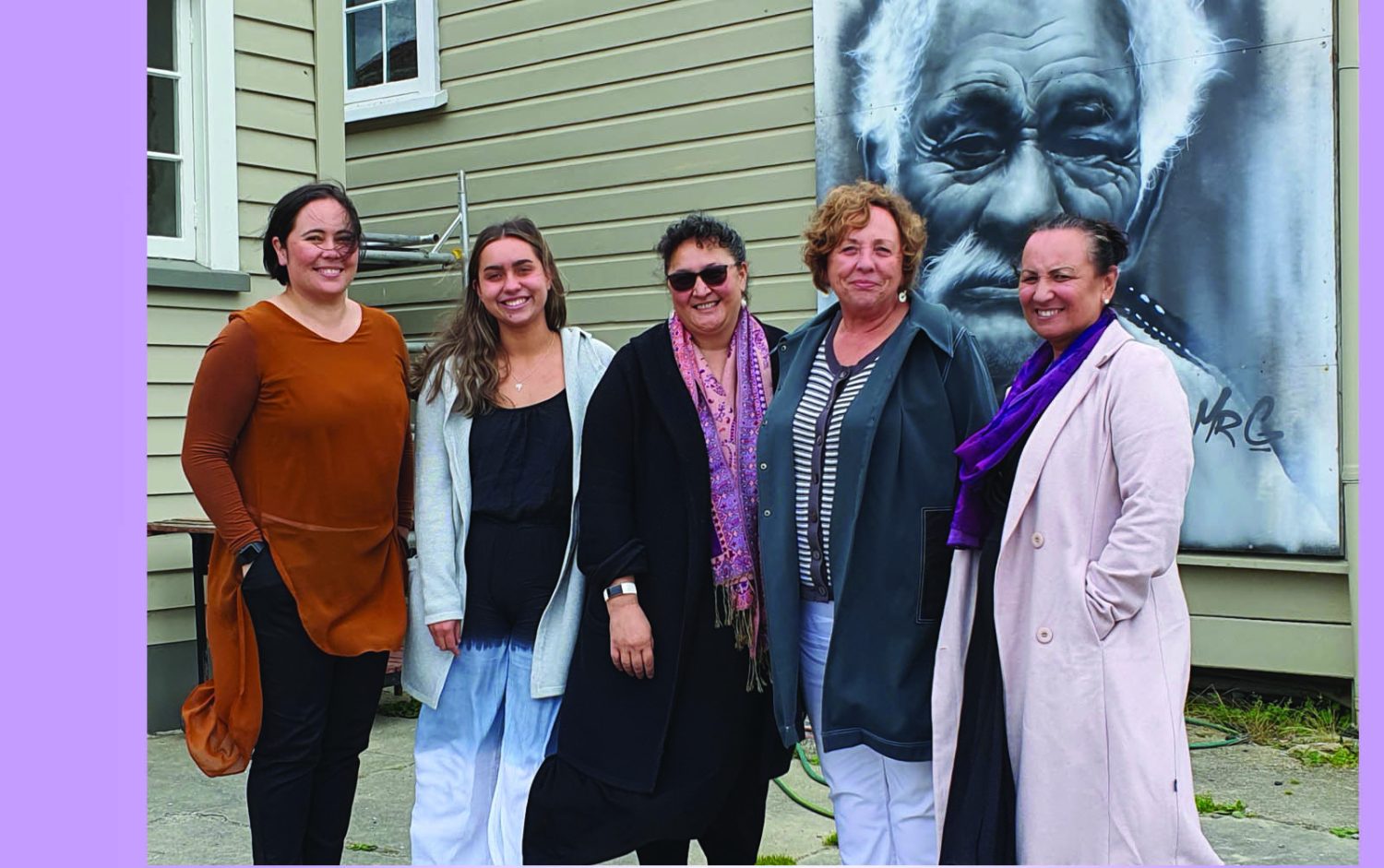Surviving the slings and arrows of life is never easy, irrespective of age. But, as people grow older, the volleys can be harder to hold at bay, especially for Māori. Social inequities, poorer access to healthcare, and a history of systemic racism all mount a relentless assault on Māori health and wellbeing.
Addressing—and redressing—the specific challenges Māori face was a key component of Ageing Well’s Contestable Funding Round in 2016. Inherent in that process was a desire to draw upon the opportunities open to Māori.
Ageing Well Principal Investigator, Professor Brendon Hokowhitu (Ngāti Pūkenga), knew exactly what that meant: Empower kaumātua (those Māori 55 and over), to age independently, with dignity, and based on their own worldview. More crucially, to draw upon Māori themselves, their strengths and knowledge (mātauranga), to make it happen.
Fighting against a pervasive belief that older people are a “burden” and drain on the nation’s coffers, Professor Hokowhitu, Dean of Faculty of Māori and Indigenous Studies at the University of Waikato, wanted to show that older people can and do contribute to our society. In the process, he aspired to reframe how we think about ageing.
For Māori generally, ageing is a positive development: the older you are, the more you have to contribute. And they do want to contribute.
For Māori generally, ageing is a positive development: the older you are, the more you have to contribute. And they do want to contribute.
In this study, Professor Hokowhitu’s team wanted to see if a peer-mentorship programme — a “for kaumātua, by kaumātua” intervention — could meet the health and social service needs of a group of selected older Māori in Hamilton. Essentially, one group of experienced kaumātua would shepherd younger peers through challenging situations.
The project not only aimed to empower individual kaumātua involved in the programme (and benefit their whānau, hapū, and iwi), but also offer an “opportunity for not just Māori but all of New Zealand to reframe the discourses surrounding our ageing population,” Professor Hokowhitu explained.
So what happened?
Professor Hokowhitu’s team partnered with local organisation Rauawaawa Kaumātua Charitable Trust, whose CEO, Rangimahora Reddy, was actively involved in the research. Open dialogue with the Trust ensured that the project was “contextual” and “culturally safe”, Professor Hokowhitu says. Working side-by-side, the research team and Rauawaawa built a partnership that provided the traction needed within the community.
Together, they developed the peer-support programme for kaumātua. Experienced kaumātua (tuakana) were trained to help their younger peers (teina) undergoing a significant life transition—for instance, loss of a spouse, loss of independence, or changing health conditions. To successfully navigate these moments, Professor Hokowhitu argues, having senior kaumātua work with their peers was a win-win situation.
“Kaumātua who have experienced a ‘significant transition’ are the best people to be working with and mentoring other kaumātua who may be experiencing something very similar. It’s a strength-based approach that respects the knowledge and skills kaumātua have in abundance,” Professor Hokowhitu said.
After an initial orientation, the tuakana peer educators had three conversations with up to six teina, and acted as wayfarers leading their teina through the sometimes treacherous storms of ageing. They also provided the teina with key information about health and social services available.
 “Kaumātua who have experienced a ‘significant transition’ are the best people to be working with and mentoring other kaumātua who may be experiencing something very similar."
“Kaumātua who have experienced a ‘significant transition’ are the best people to be working with and mentoring other kaumātua who may be experiencing something very similar."
Results
Encouraging experienced kaumātua to help their younger peers through life’s challenges proved successful and cost-effective.
A total of 180 kaumātua were recruited to the intervention with 121 completing the study. Participants completed assessments of health and mana motuhake (autonomy and self-actualisation) measures consistent with Māori worldviews prior to and following the peer education intervention. Additionally, qualitative evaluations were given including open-ended questions and participation in five focus groups.
Positive improvements occurred after the teina had finished their conversations with tuakana. Of particular note were the statistically significant intervention effects upon teina’s ‘tribal identity’, and ‘trouble paying bills’, Professor Hokowhitu noted. Tuakana also proved to be effective communicators, whose abilities were rated highly by both teina and independent assessors.
Teaching appears to be good for their health and wellbeing, too: Kaumātua reported an improved sense of purpose after finishing the programme. When benchmarked against the conventional threshold of cost-effectiveness, this intervention was “definitely costeffective”, Professor Hokowhitu reported.
The findings show that kaumātua strengths and knowledge can be successfully deployed to improve health and social outcomes of their peers, Professor Hokowhitu concluded.
Outcomes
This research did not occur in a sterile, white lab. Embedded in the heart of the community, the researchers worked hand-in-hand with a local service provider — Hamilton’s Rauawaawa Kaumātua Charitable Trust.
The cooperation provided the project traction and momentum with the community and participants. Like other Ageing Well projects, it demonstrated the importance of working in partnership with the people you strive to help.
Upon completion of this project, Ageing Well National Science Challenge awarded a new grant of $2.5 million to the team to expand the scope and reach of the project. Titled Kaumātua Mana Motuhake Pōi, the new research will involve up to 350 Māori kaumātua from across Aotearoa. In addition to the tuakana-teina peer intervention, the project will also trial an intergenerational model for increasing physical activity and cultural knowledge exchange (mātauranga), including te reo Māori.
The cooperation provided the project traction and momentum with the community and participants. Like other Ageing Well projects, it demonstrated the importance of working in partnership with the people you strive to help.
Conclusion
Professor Hokowhitu’s project is a welcome tonic in the dismissive age of “OK, Boomer”. It offers a clarion call to policymakers and New Zealanders at large: older Kiwis do and can contribute to our society.
Drawing on the strengths of older kaumātua — their experience, wisdom and eagerness to contribute — the younger peers were successfully shepherded through some of the most difficult moments of an older person’s life.
And everybody wins in this model: the kaumātua peer educators gained a greater sense of purpose; the younger peers learned ways to cope with the slings and arrows of life; and both groups’ health and wellbeing soared.
The bottom line is that this project has created a cost-effective, community-led, kaumatua-administered health intervention improving the lives of older Māori.
For further information, please visit the Kaumātua Mana Motuhake Pōi page at Waikato.


